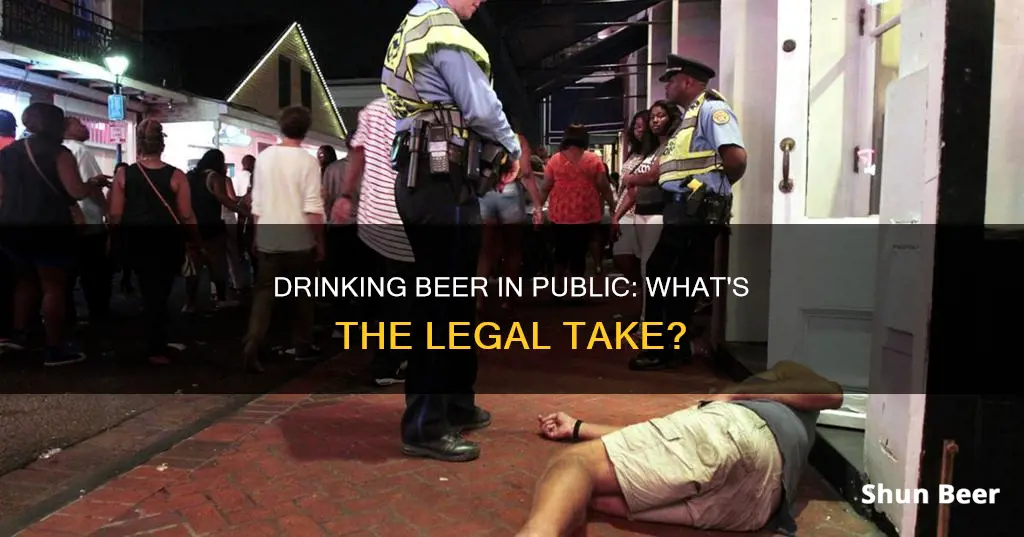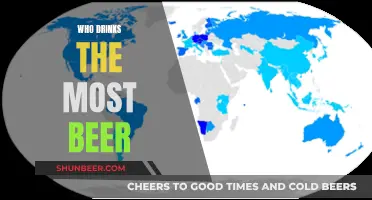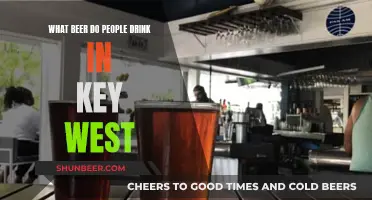
Drinking on the street is a topic that sparks debate, with some countries and states having stricter laws and social norms surrounding public alcohol consumption than others. While some countries frown upon drinking in public spaces, such as Norway, Poland, India, and Sri Lanka, other countries, like Denmark, Portugal, and Germany, view it as a normal part of their social culture. In the United States, for example, public drinking laws vary from state to state, with some states like Georgia, Louisiana, and Nevada not actively banning it, while others have stricter open container laws. Even within states, there can be variations, with certain cities and entertainment districts allowing public drinking. Ultimately, the social acceptability of drinking on the street depends on the cultural norms and legal framework of a particular region.
| Characteristics | Values |
|---|---|
| Countries where drinking in public is almost universally condemned or outlawed | Norway, Poland, India, Sri Lanka, Muslim-majority countries where alcohol is legal, and some states in the United States |
| Countries where drinking in public is socially acceptable | Denmark, Portugal, Spain, Germany, the United Kingdom, New Zealand, Japan, Finland, China, Brazil, Colombia, the Czech Republic, Hungary, Italy, the Republic of Ireland, Singapore, and more |
| Arguments against drinking in public | Encourages overconsumption of alcohol, rowdiness, violence, littering, and increases the risk of broken glass bottles |
| Arguments for drinking in public | Does not cause problems, social problems cause overconsumption and violence, helps normalise attitudes towards drinking and builds a healthier drinking culture |
| US states with no statewide open container ban | Idaho, Wyoming, North Dakota, South Dakota, Minnesota, Wisconsin, Illinois, Michigan, North Carolina, Delaware, New Jersey, Connecticut, Massachusetts, Rhode Island, New Hampshire, Vermont, Maine, Alaska, Georgia, Louisiana, Missouri, Montana, Nevada, and Pennsylvania |
| US cities that allow drinking in public | Fredericksburg, TX; Hood River, OR; East Aurora, NY; Erie, PA; Arlington, TX; Fort Worth, TX; New Orleans, LA; Indianapolis, IN; Gulfport, MS; Las Vegas, NV; Treasure Island, FL; Butte, MT; Sonoma, CA; Memphis, TN; Savannah, GA; Lincoln, NE; Huntsville, AL; Louisville, KY; Birmingham, AL; Montgomery, AL; Mobile, AL; Canton, OH |
What You'll Learn

Drinking in public in the US
Drinking in public is generally prohibited in the United States, but some cities and states have more relaxed laws than others. In the US, "public" refers to outdoor spaces such as roads, walkways, and parks. Drinking in bars, restaurants, stadiums, and similar establishments is not considered drinking in public.
Some US states have statewide bans on public drinking, while others leave it up to local municipalities to create their own laws. While drinking in public is illegal in most US jurisdictions, there are some places and circumstances where public alcohol consumption is accepted. This includes cities like New Orleans, Las Vegas, Atlantic City, Indianapolis, and Gainesville, Florida, as well as the state of Wisconsin, certain college campuses, and specific sporting events such as tailgate parties.
Even in cities that have become famous for allowing visitors to drink wherever they please, like New Orleans and Las Vegas, there are still some restrictions. For example, in New Orleans, you can drink anywhere in the city, but your beverage must be in a plastic cup. In Las Vegas, you can drink on the Strip, but glass containers and drinking within 1000 feet of the liquor store where you bought your beverage are not allowed.
Some towns allow public drinking anywhere within the town limits, while others only allow open containers in specific entertainment districts. For example, in Sonoma, California, you can drink in Sonoma Plaza, the only park in Sonoma that allows alcohol. In Kansas City, Missouri, you can drink in the Power and Light District, an entertainment district spanning eight blocks, as long as your drink is in a plastic cup.
- Beale Street in Memphis, Tennessee
- The Savannah Historic District in Savannah, Georgia
- Fredericksburg, Texas (only beer and wine are allowed, and only in the main shopping district)
- Hood River, Oregon (but you can't take mixed drinks from a bar into the street)
- Erie, Pennsylvania (there are no open container laws anywhere in the city)
- Butte, Montana (public drinking is allowed from 8 am to 2 am)
- The Railyard District in Lincoln, Nebraska
- Quigley and Meridian Districts in Huntsville, Alabama
- 4th Street Live! in Louisville, Kentucky
- Dauphin Street in Mobile, Alabama
- The DORA (Designated Outdoor Refreshment Area) in Canton, Ohio
Draught Beer: How Does It Work?
You may want to see also

Drinking in public in the UK
Drinking in public is generally accepted in the UK, but there are some laws and rules in place that restrict it in certain areas. While there is no general prohibition on drinking in public spaces, certain offences relating to alcohol may be committed in these places. For example, it is illegal to be drunk and disorderly in a public place or on any highway in England and Wales.
In England and Wales, councils can use a 'Public Spaces Protection Order' (PSPO) to restrict drinking in public in specific locations. This gives police officers the power to stop people from drinking in certain areas and confiscate their alcohol. PSPOs are used when alcohol is associated with anti-social behaviour. It is an offence to fail to comply with a request to stop drinking or surrender alcohol in a controlled drinking area.
In Scotland, each local council has its own set of bylaws regarding where over-18s can and cannot drink in public. Many councils, such as Glasgow, prohibit drinking alcohol or carrying an open container of alcohol in public places. In Northern Ireland, councils can also introduce bylaws to restrict alcohol consumption in certain areas or during parades.
Drinking alcohol in banned areas or refusing to comply with a police officer's request can lead to a fine or arrest. Underage drinking in public is also illegal throughout the UK, and those under 18 can be stopped, fined, or arrested by the police.
In addition to public spaces, drinking alcohol is banned on many public transport services in the UK. This includes services such as TfL buses, trams, tubes, and Docklands Light Railway in London, ScotRail train services in Scotland, and Translink trains and buses in Northern Ireland. Drinking alcohol on these services can result in fines or being refused permission to travel.
Beer and Pfizer: Safe to Drink After the Vaccine?
You may want to see also

Drinking in public in Europe
Drinking in public is generally more accepted in Europe than in the United States, where open container laws are strict and can lead to heavy fines or arrest. However, laws and social norms regarding public drinking vary across Europe. While some countries have lenient rules and attitudes towards drinking in public, other countries have strict restrictions and social condemnation of the practice.
Germany
Drinking in public is permitted in Germany, and many German cities are known for their liberal alcohol laws. However, there are some important exceptions and additional regulations to be aware of. For example, drinking in public is forbidden on Good Friday and All Saints Day (1 November). Additionally, while drinking is allowed on public transport, cycling a bicycle while under the influence is forbidden and can result in a psychological evaluation.
United Kingdom
In England and Wales, public drinking is legal, and it is not illegal to drink in "Controlled Drinking Zones" or "Designated Public Places Orders" (CDZs). However, police may request that individuals stop drinking and surrender their alcohol if they are acting antisocially. In Scotland, each council has its own bylaws regarding public alcohol consumption, with some areas prohibiting drinking in public places.
France
Public drinking is legal in France for those of legal drinking age. However, local laws may ban public drinking or the purchase of alcohol in certain areas or at certain times. It is important to note that public intoxication is illegal in France, and individuals may be detained and fined if they are found to be intoxicated in public.
Italy
There are no national laws against public drinking in Italy, although local municipalities can issue regulations prohibiting public drinking in certain locations or during specific times. It is important to note that public drunkenness is illegal in Italy, and individuals may be fined if they are found to be manifestly drunk in a public setting. Additionally, some sources suggest that drinking in groups of three or more is prohibited in Rome.
Czech Republic
Drinking in public is generally legal in the Czech Republic, but each community is entitled to restrict public drinking by ordinance. For example, certain streets in Prague, such as Dlouha and Old Town, have strict no open container laws, and drinking in these areas can result in a substantial fine.
Spain
Drinking in public is not allowed in Spain, and doing so can result in a hefty fine. However, it is common to see people selling and consuming alcohol in public places, especially in tourist areas like Barcelona. The tradition of "botellón", or public binge drinking, is popular among teenagers and young adults as a way to save money and socialize.
Greece
While drinking in public is technically allowed in Greece, it is not a common practice among locals. Tourists may drink in public, but they should be mindful of local norms and avoid public drunkenness, as it is considered offensive in Greek culture.
Poland
Drinking in public has been illegal in Poland since 2018, and the police take a strict approach to enforcing this law. However, municipal authorities may allow drinking in designated areas.
Austria
In Austria, the possession and consumption of open containers of alcohol are legal throughout the country for those of legal drinking age. The legal drinking age varies depending on the type of beverage.
Denmark
Public drinking is generally legal in Denmark and is considered socially acceptable. However, it is frowned upon for individuals under the age of 15 to drink in public.
Other European Countries
Other European countries with lenient laws and social norms regarding public drinking include Belgium, Switzerland, Hungary, Japan, and China. On the other hand, countries like Norway, India, and Muslim-majority countries generally condemn or outlaw public drinking.
Beer Without Food: A Shortcut to Fat Loss?
You may want to see also

Drinking in public in Asia
Drinking in public is a divisive issue, with some countries allowing it, some condemning or outlawing it, and others having a mix of the two. In Asia, the laws and social norms surrounding drinking in public vary from country to country and even within countries. Here is an overview of drinking in public in various parts of Asia:
Singapore
Singapore has laws that ban the consumption and sale of alcohol from 10:30 pm to 7 am island-wide. However, drinking in public is generally allowed outside of these hours.
Thailand
The legal drinking age in Thailand is 20, but this law is rarely enforced, especially for tourists. The sale of alcohol is banned at certain times and during some religious festivals.
Indonesia
In Indonesia, the legal drinking age and the enforcement of drinking laws vary depending on the region. In the province of Aceh, which practises strict Syariah law, and in the capital, Jakarta, alcohol is strictly prohibited. In contrast, in Bali, a predominantly Hindu area, alcohol regulations are weakly implemented.
Philippines
In the Philippines, drinking in public is banned during elections or large-scale public events. While there are laws that prohibit public drinking in places like Manila, the fines are small, and people often continue to drink in public anyway.
Brunei
In Brunei, both the sale and consumption of alcohol in public are prohibited. However, non-Muslim tourists above the age of 17 can bring alcohol into the country, but consumption must be done in private.
China
China has a strong drinking culture, and alcohol consumption is broadly accepted and featured heavily in traditional folklore and modern media. Drinking in public is widely accepted, and there are no laws against it. Alcohol regulations are described as "lax", and alcohol is sold in various places, from convenience stores to street stalls.
Japan
Japan has no laws forbidding public drinking, which is a common custom in cities and parks, especially during local festivals and cherry blossom viewing in spring. The legal drinking age in Japan is 20.
Central Asia
In Central Asian countries like Kazakhstan, Kyrgyzstan, Turkmenistan, Tajikistan, and Uzbekistan, there is an overall decrease in alcohol consumption. The minimum legal age to purchase alcohol varies, with Kazakhstan, Turkmenistan, and Tajikistan setting it at 21, Uzbekistan at 20, and Kyrgyzstan at 18. These countries have various restrictions on alcohol sales, such as banning sales on specific days or within certain distances of educational institutions.
India
Drinking in public is generally frowned upon in India by religious entities. While it is unusual to drink on the streets, it is more common in areas with bars or wine stores.
Muslim-Majority Countries
In Muslim-majority countries where alcohol is legal, public drinking is often condemned or outlawed. However, there are exceptions, such as Indonesia, where the laws vary by region, and Central Asian countries like Uzbekistan and Tajikistan, which allow alcohol sales under certain restrictions.
Drinking Beer While on Buspar: What You Should Know
You may want to see also

Drinking in public in South America
Drinking in public is generally prohibited in South America, though the legal drinking age and the legal purchase age vary across the continent. In most South American countries, the legal drinking age is 18, with the exception of Paraguay, where the drinking and purchase age is 20, and Guyana, where minors aged 16 or 17 may consume a glass of beer or wine in a restaurant if they buy a meal.
In South America, drinking in public is prohibited, though the laws are not always enforced. Beer, wine, and liquor are sold in most supermarkets and small convenience stores from Monday to Saturday. No liquor is sold on Good Friday, Easter Sunday, or election days.
Low-Carb Diet and Beer: Is It Possible?
You may want to see also
Frequently asked questions
It depends on where you are in the US. Some states, such as Georgia, Louisiana, Missouri, Montana, Nevada, and Pennsylvania, allow open containers in public. However, some states ban public drinking anywhere within state lines. Many towns allow public drinking, but prohibit it in public parks or close to religious sites or homeless shelters.
Proponents of the right to drink in public argue that drinking in public does not cause problems and that it is social problems that cause overconsumption and violence. They also argue that drinking in public helps to normalise attitudes towards drinking and builds a healthier drinking culture.
Opponents of drinking in public argue that it encourages overconsumption of alcohol, rowdiness, and violence. They propose that people should instead drink in private businesses or at home. Opponents are also concerned about the risks associated with public inebriation, such as broken bottles on the street and aggressive behaviour.







